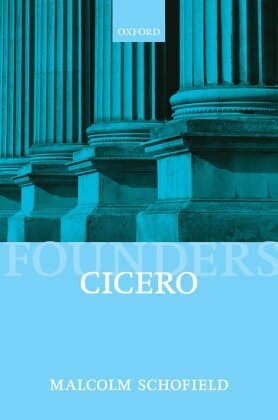| Verlag | Oxford University Press |
| Auflage | 2021 |
| Seiten | 300 |
| Format | 15,6 x 1,7 x 23,5 cm |
| Print PDF | |
| Gewicht | 458 g |
| Artikeltyp | Englisches Buch |
| Reihe | Founders of Modern Political and Social Thought |
| EAN | 9780199684922 |
| Bestell-Nr | 19968492EA |
This book offers an innovative account of Cicero's treatment of key political ideas: liberty and equality, government, law, cosmopolitanism and imperialism, republican virtues, and ethical decision-making in politics. Cicero (106-43 BC), a major figure in Roman politics, was the first to articulate a philosophical rationale for republicanism.
This book offers an innovative analytic account of Cicero's treatment of key political ideas: liberty and equality, government, law, cosmopolitanism and imperialism, republican virtues, and ethical decision-making in politics. Cicero (106-43 BC) is well known as a major player in the turbulent politics of the last three decades of the Roman Republic. But he was a political thinker, too, influential for many centuries in the Western intellectual and cultural tradition. His theoretical writings stand as the first surviving attempt to articulate a philosophical rationale for republicanism. They were not written in isolation either from the stances he took in his political actions and political oratory of the period, or from his discussions of immediate political issues or questions of character or behaviour in his voluminous correspondence with friends and acquaintances. In this book, Malcolm Schofield situates the intimate interrelationships between Cicero's writings in all these mo des within the historical context of a fracturing Roman political order. It exhibits the continuing attractions of Cicero's scheme of republican values, as well as some of its limitations as a response to the crisis that was engulfing Rome.
Inhaltsverzeichnis:
1: Introduction: contexts
2: Liberty, equality, and popular sovereignty
3: Government
4: Cosmopolitanism, imperialism, and the idea of law
5: Republican virtues
6: Republican decision-making
7: Epilogue: philosophical debate and normative theory
Bibliography
Index of passages
General index
Rezension:
Cicero: Political Philosophy, with its densely yet subtly inter-connected chapters, excellent bibliography, and phenomenal choice of quotations from the largest body of work of a single author to come down to us from Graeco-Roman antiquity, is no exception in this and exceptional in its field. Gavin M. Stewart, Ethical Theory and Moral Practice

